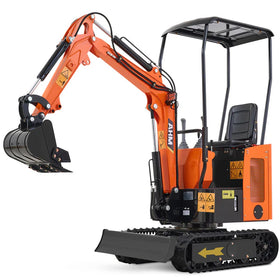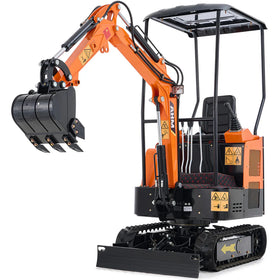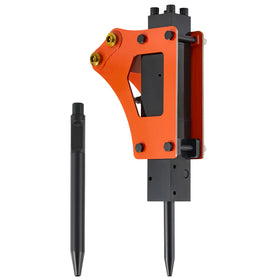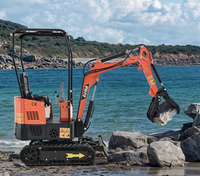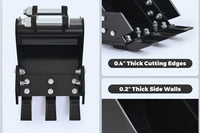(Reading time: 5 ~ 7 minutes)
The sight of an aging structure in the backyard and steep contractor demolition quotes often drive homeowners to explore DIY alternatives. You’ve probably stood there, coffee in hand, staring at the structure and thinking, “I could probably handle this myself with the right equipment.” But before you pull up your sleeves to tear down a small bungalow or a large structure, it’s important to understand the process, the right equipment, and the logistics involved.

1. Understanding The Basics of House Demolition
House demolition involves dismantling or tearing down a building. The process can vary significantly depending on the structure of the house and local regulations. For a small or medium-sized home (around 700-1,000 sq. ft.), mini excavators would be the go-to choice for homeowners to do the job themselves or with a crew of friends.
2. Why Use a Mini Excavator for Demolition? And When to Not Use It?
Mini excavators transform what used to be week-long demolition projects into weekend work for most single-story homes under 1,000 square feet. The compact size of mini excavators lets operators maneuver in tight suburban lots while still packing enough power to pull down walls and break up foundations. A seasoned operator can take down a small bungalow in a day, sort the debris the next, and have the site cleared by Sunday evening.
When Not to Use a Mini Excavator
The limits of mini excavators become clear with certain structures. If your demolition project falls into one of these categories, you might need to consider alternatives:
1. Very Large or Multi-Story Homes
If you’re tearing down a large house or a multi-story building, you may need a larger excavator with more reach and lifting capacity. Larger machines can break down structures more efficiently, especially those with multiple floors or heavier materials like brick or steel.
2. Homes Built with Heavy Materials
If your house is made of particularly thick concrete, steel beams, or other heavy-duty materials, you may need a more robust machine than a mini excavator. Larger excavators or specialized equipment like hydraulic hammers might be necessary to tackle these tougher materials.
3. Unstable or Hazardous Structures
If your house is severely damaged, structurally unstable, or contaminated with hazardous materials like asbestos, it’s critical to evaluate the condition of the building before deciding on the equipment. In such cases, it may be safer and more efficient to hire a professional demolition contractor, who can assess the situation and use the right tools to safely tear down the structure.

When Mini Excavators Are Ideal for Your Home Demolition
If you’re dealing with a smaller, single-story home (under 1,000 square feet), a mini excavator can tear it down quickly and efficiently. It’s a popular choice for DIY homeowners or those who want to minimize costs by doing part of the work themselves.
In some cases, homeowners need to tear down only a portion of their house. It could be a garage, an old shed, or a few internal walls. Mini excavators excel at this type of house demolition, especially when you don’t want to damage the rest of the property.
On average, you can expect the process to take anywhere from 1 to 3 days for a small, single-story house (around 700-1,000 square feet).
The mini excavator can speed up the demolition significantly compared to manual methods, as it allows you to break down walls, remove debris, and clear out the foundation much more quickly.
How Much To Rent a Mini Excavator (In Case You Wonder)
Renting a mini excavator is usually much cheaper than hiring a full-sized excavator or a professional demolition crew. On average, mini excavator rentals in the U.S. typically cost between $200 and $500 per day. For longer-term rentals, you can expect to pay $1,000 to $3,000 per week, depending on the size and type of equipment. These prices can fluctuate based on location and rental company. For example, renting in metropolitan areas tends to be on the higher end of the spectrum, while rural areas might offer lower rates.
3. What Size Excavator Do You Need for a House Demolition?
The size of the excavator you need largely depends on the size of the house you're demolishing and the conditions of the worksite. For most small to medium residential projects, a mini excavator in the 1 to 3-ton range is sufficient. They are compact, easy to transport, and powerful enough to tackle most residential demolition jobs.
- For Larger Homes or Tougher Materials: If you're demolishing a larger home or dealing with materials like thick concrete or brick, you may need a bigger excavator (around 5 to 10 tons) or specialized attachments.
- Limited Access or Tight Spaces: If your home is in a confined space (like a narrow backyard or between two structures), a 1 ton mini excavator might be a better option to ensure you can maneuver it effectively.
4. How Much Does House Demolition Cost
The cost to demolish a house can vary significantly based on a number of factors, including the size of the home, location, and whether you’re doing the work yourself or hiring a professional. On average, demolition costs range from $4,000 to $15,000 for a standard single-family home, though smaller homes can cost less.
Additional Costs to Consider:
- Permits: You’ll need a demolition permit, which can cost anywhere from $100 to $1,500 depending on local regulations.
- Utility Disconnections: Shutting off utilities (water, gas, electricity) before demolition begins is a must. Hiring a professional to disconnect utilities can cost a few hundred dollars.
- Waste Disposal: After demolition, you'll need to dispose of the debris. A roll-off dumpster or local landfill fees can add to the total cost.
5. Preparing for the Demolition
Before you start the demolition, there are several key preparations to make sure everything runs smoothly and safely.
- Obtain a Demolition Permit: Most cities and counties require a demolition permit before any work can begin. The cost and requirements for these permits can vary depending on your location, so it's important to check with your local building department. Permits typically cost anywhere from $100 to $1,500.
- Disconnect Utilities: To avoid accidents, you’ll need to disconnect utilities like gas, electricity, and water. This may require professional help, especially for gas and electric lines, and typically costs $100 to $300. Ensure that all utility services are safely shut off before you start any demolition work.
- Inspect for Hazardous Materials: Older homes may contain hazardous materials such as asbestos, lead paint, or mold. If your house was built before the 1980s, it’s essential to have it inspected by a professional to identify these hazards. Other than that, according to EPA's asbestos regulations, any building demolition requires an asbestos inspection before house demolition work begins.
- Prepare for Waste Disposal: Demolition creates a significant amount of waste, so you’ll need a plan for disposal. Renting a roll-off dumpster can cost between $300 and $800 depending on the size and the type of debris. Alternatively, some companies offer debris removal as part of their demolition services.
- Safety Gear: Demolition can be dangerous, so don’t forget your safety equipment. This includes a hard hat, goggles, gloves, boots, and a respirator mask to protect yourself from dust and debris. You can expect to spend about $50 to $200 on basic safety gear.
Pro Tip: Make sure to have more safety gear than you think you’ll need. The dust from tearing down drywall or concrete can be hazardous
6. How to Use a Mini Excavator for House Demolition

Once you’re ready to go, operating a mini excavator for demolition is relatively straightforward, but it’s important to approach the task carefully and methodically.
Start with the Roof: Tearing down the roof first allows you to clear the top-down, preventing any heavy debris from falling on you while you work on the walls and foundation. Depending on the material, this can be done quickly with the mini excavator’s bucket or a specialized mini excavator attachment.
Work from the Outside In: Begin demolishing the exterior walls, then work inward toward the interior. This ensures the structure remains stable while you remove material. With a mini excavator, you can break down walls in sections, making it easier to manage the load of debris.
Use the Right Attachments: Depending on the job, you may need specific mini excavator attachments. A bucket is good for general demolition, but if you’re dealing with concrete or tough materials, a hydraulic breaker might be required to break through solid walls or foundations.
Take It Slow: Rushing through the demolition process could lead to accidents, or damage to surrounding structures. Make sure you stay aware of your surroundings and proceed with caution.
7. Conclusion: Are Mini Excavators the Right Choice for Your House Demolition?
For many homeowners, mini excavators offer the perfect balance of power, maneuverability, and cost-effectiveness. However, it’s important to assess your specific project before deciding if a mini excavator is the right tool. While mini excavators are great for smaller homes and selective demolition, they may not be the best option for large, multi-story buildings or homes built with heavy materials. In those cases, opting for a larger excavator or professional help might be necessary to ensure a safe, efficient demolition.
If you decide to go the DIY route with a mini excavator, make sure you're prepared with the right permits, safety gear, and waste disposal plan. By taking the proper precautions and understanding your equipment, you can save significant money on labor costs while still getting the job done effectively.


